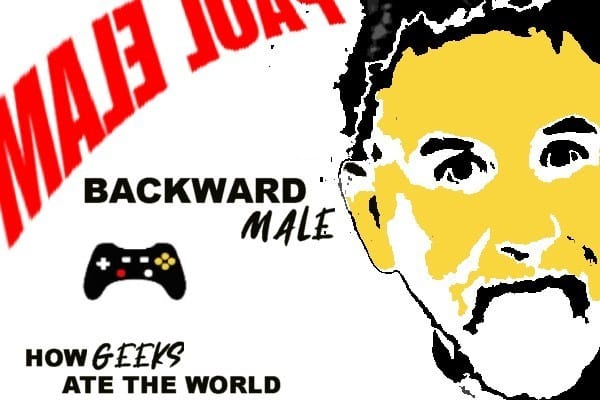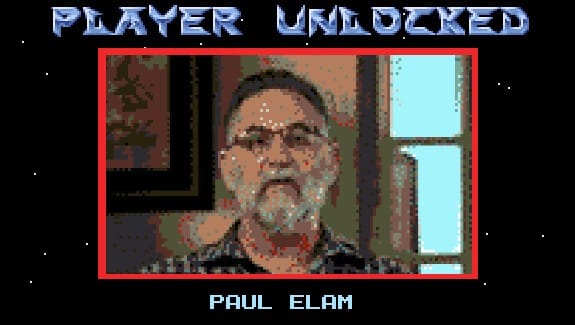🔒 How Geeks Ate the World: Backward Male
Paul Elam and the origins of an internet phenomenon known as the manosphere.

How Geeks Ate the World is the working title of a book that I’m writing, exploring the development of reactionary movements in geek culture (media, tech, and hobbies) since the internet era, and how these movements have come to dominate real world politics in pretty horrifying ways.
I will be publishing chapters and essays related to this project for paying subscribers around once a month. Unlike my regular newsletter, these essays will remain paywalled.
Episode 1 - How Geeks Ate the World
Episode 2 - Demons of Suspicion
👉Episode 3 - Backward Male
Episode 4 - The Californian Ideology
Episode 5 - Something Old, Something New, Something Rotten, Something Awful
Episode 6: The Bomb that Japan Dropped on America
Paul Elam is a tower of a man, tall and broad-shouldered, and unlike Warren Farrell, he was never a feminist. That is to put it mildly, although the two men have curious similarities in their upbringing.
Farrell claims that he can trace his origin story back to his relationship with his mother, who he loved and respected. She was a strong woman who raised her sons during the earliest years of feminism’s second wave. She prided herself on her independence and refused to take orders from either her husband or her boys, but below the surface she suffered depression from the pressures of the newly liberated woman.76
Paul Elam makes much the same claim about his origin. The way he describes his mother’s character, she and Farrell’s mother might as well have been the same woman. The striking difference is that Elam despised her for it.
He reveals much about what he regards to be his awakening and the source of his rejection of feminism from a very young age—before he even knew what feminism was—in a 2014 podcast hosted by another notorious refugee from feminism, Erin Pizzey:
Pizzey: You know, Paul, I always think a very good thing to do is to go right back and see if you can, just off the top of your head, remember the first time, whatever age you were, when things didn’t seem quite right.
Elam: I can tell you exactly what that was. Um, to give a little background, I was—I grew up in a military family, my father was a career army, fought in Korea, was an advisor in Vietnam, um, had all the scars to prove it, um, very traumatized man, very rigid authoritarian type from that generation—
Pizzey: Of men.
Elam: Um, and my mother, a very hard-working housewife and mother that, uh, took care of her children, and yet there was something wrong with the picture. Uh, and it was really strange because it took me a long time to figure out that it wasn’t my father that was in charge. That he was, um, he was—I mean, and, he was a guy that, you wouldn’t cross him. Um, and physically abusive, violent, um, absolutely rigid in terms of being in control of his children, and appeared very much—when he was home, anyway, because you know the military takes you a lot, but appeared very much to be in charge, all the time. And, um, I think I figured out, about thirteen, that he wasn’t, and it was really interesting, it was, um, an incident—(laughter) This is almost embarrassing, and it’s very personal, but, uh, I promised to talk about personal stuff this time. An incident when I was thirteen with not wanting to take some medicine. And I was just, refused to take some medicine for diarrhea. And my mother had decided that I was going to take it. And it ended up in a scene with both of my older brothers sitting on me on the floor while my mother cracked me with these wooden spoons in the middle of the kitchen, screaming at me, and I wasn’t going to take it, and it was just a very bizarre scene that I had just decided to rebel.
Pizzey: It was horrific, wasn’t it. Absolutely horrific.
Elam: Uh, yeah! It was. And it was even more horrific in retrospect than it was at the time, but I felt like for some reason that I was engaged in the battle for my life. And the neighbors even came knocking at the door, and I remember my mother getting off of me, my brothers still holding me down, and running to the back door, and opening the door and saying “No, everything’s okay”—boom—shutting the door. And I was a rebel from that moment on. Uh, I knew something was wrong in that situation. And my family thought that was normal.
Pizzey: That’s why it took you probably so long to suddenly recognize, because, in your own way, you were trying to put down a boundary.
Elam: Yes. I was.
Pizzey: Yeah, you had the right to say no.
Elam: And, uh, it was absolutely alien to her—
Pizzey: Yeah.
Elam: The idea that anybody would ever—any of her children would ever say “no” about anything. And she wasn’t going to have it. And I think that set up a battle between my brothers and myself, a lot of family angst, because I, for whatever reason, was elected to be the one in my family that was going to say no to the control.
Pizzey: Well, did you ever consider that you might be making a step towards health, which they weren’t?
Elam: In retrospect I know that that was exactly what I was doing.77
Erin Pizzey, who is on the editorial staff of Elam’s website A Voice For Men, is a highly prized recruit for the MRM. She holds the historical credit for having established the first ever battered women’s shelter in the UK in 1971. This action catapulted Pizzey directly into the deep end of second wave feminism whether she wanted to be there or not, and it didn’t take long for her to decide that she did, in fact, not.
On another timeline, for all the work that she did to liberate women from domestic abuse in the 1970s, Pizzey might today have been a household name in feminism alongside Gloria Steinem. Instead, by 2010, she was penning op-eds for right-wing tabloids denouncing feminism as a lie.57
Reading her story, I recognize many of the concerns that she had about academic feminism during the second wave as being similar to my first interaction with the third wave much more recently—that the daughters of suffrage had strayed far from their proletarian roots and formed an insulated echo chamber behind the walls of academia. That it was locked down too tight by the chained gates of purity politics. “Why was the women’s movement so difficult to join? What had happened to having a good time and women laughing together? So far most of the ones I’d met through Women’s Liberation seemed to have a serious humour deficit.”78
In her activism and advocacy against domestic violence Pizzey had been right down there on the ground floor talking to survivors and helping women pick up the pieces. From first-hand accounts she concluded that much if not most of domestic violence was reciprocal—in violent relationships, women served it as much as they received it. But academic feminism, she recounts, didn’t want to hear any of this. To make things worse, a large number of the feminists she interacted with were outspoken Maoists.57 This hit all the wrong notes for Pizzey. Her father, a British diplomat, had experienced first-hand the persecutions of the Chinese Communist Party.78
Pizzey’s backlash against feminism was in many ways similar to that cited by Christina Hoff Sommers—for one, rightly or wrongly, its association with communism that grated against their Cold War patriotism, and for another, the perceived anti-men sentiment that put pressure on their genuine love for their husbands.
A theme that unites Pizzey’s philosophy with that of all men’s movements to various extents is that the problems that both men and women face in society do not arise from a so-called patriarchy, which many contend does not exist and some go so far as to say that it never has.75 Alternatively, these are just psychological realities arising from the differences between the sexes. An early Shepherd Bliss, borrowing strongly from Warran Farrell, said “Women assume men are powerful because of how powerless they feel.”79
Pizzey in particular theorizes that domestic violence, for the most part, does not arise from men battering their spouses, but is instead a consequence of an addiction to violence suffered by both parties, of which neither is innocent. This explains, she believes, why so many ostensively “battered” women return to their husbands.57
Feeling that men were being unfairly maligned by the women’s movement and their points of view mocked and ignored, Erin Pizzey, along with Warren Farrell, turned ultimately to Paul Elam.

Unlike most of the individuals I’ve mentioned, who might be characterized as feminist dissenters early on, Paul Elam’s philosophy is gloves-off antifeminism. The Southern Poverty Law Center refers to him as a male supremacist.80 For what it’s worth, I believe that’s hyperbolic. But he’s also a master of leading a credulous media, something that more contemporary commentators on internet culture like myself might describe as trolling.
In a July 2014 interview with hosts of the Australian morning show Sunrise, he wore his hat of respectability and the demeanor of a polite Southern working class “individual with concerns” to establish his position in much the same way that mainstream writers like Farrell would phrase it:
What we need is a re-examination of power. Just now you described a woman who is trapped between work and family – the pressures of a high-paying position, the demands that come with that, and then coming home to feeling the demands of a family that needs her in other ways. This is the same experience men have had throughout history. Now, is that power? Uh, that’s arguable, and that’s the type of discussion that we’re looking for.81
But Elam adopts a very different persona for his audience on A Voice For Men (AVFM), now the predominant online home of the Men’s Rights Movement—a site that he launched as a blog in 2008 from a laptop he carried in his semi while working as a long-haul trucker, then writing under the pseudonym “The Happy Misogynist.”82
Here, Elam is a firebrand. He doesn’t pull any punches about women and the “gynocentrism” he believes better describes western culture than patriarchy theory.83 Here he does not curb the anger he feels toward western women generally but feminists specifically and especially. There is no gynocentric decorum on AVFM, where men are free to speak their mind just as freely as they would in one of Shepherd Bliss’ mythopoetic drum circles, but with a much more sardonic tone. Elam will often stress that he is a pacifist, but that his personal unlikelihood to commit violence stands distinct from the violence that he hopes happens to his ideological opponents. In a 2011 blog entry about family courts and their purported bias against men, he says:
I know what is expected in this culture. I am supposed to express some form of outrage. I am supposed to demand changes to the system and justice for men. I am supposed to bemoan a biased system and the lost rights of fathers in this country. I do exert all that for now. I do so from the bottom of my heart.
But I am also tired. I am an older man and have witnessed this silent, ignored tragedy for far too long. I am sick and tired of the heartbreak of daily emails from broke, abused, powerless people pleading for any kind of help they can get against a system that has lost all sense of justice and every last bit of justification for its own existence.
I am tired of telling them there is nowhere to turn.
I am a pacifist. I do not advocate violence. But I tell you this. The day I see one of these absolutely incredulous excuses for a judge dragged out of his courtroom into the street, beaten mercilessly, doused with gasoline and set afire by a father who just won’t take another moment of injustice, I will be the first to put on the pages of this website that what happened was a minor tragedy that pales by far in comparison to the systematic brutality and thuggery inflicted daily on American fathers by those courts and their police henchmen.
It would not even so much be a tragedy as the chickens coming home to roost.84
Elam’s life-long vendetta against feminism and the institutional bias he perceives to exist for women against men is curious because, as far as we know, he has never personally faced any of the struggles he tirades against. In so far as records show, he has never lost custody of a child, fallen victim to a false rape accusation, been taken to the cleaners in a divorce settlement, been the victim of paternity fraud, or any other of the myriad topics that drive him to a nuclear rage.
On the contrary, Elam was the one who chose to abandon the only two publicly known children he does have. A deep investigative piece by BuzzFeed in 2015 assembled a comprehensive profile from the point of view of his former wives and daughter—a profile that he soundly refutes. The witnesses, after all, are women.



